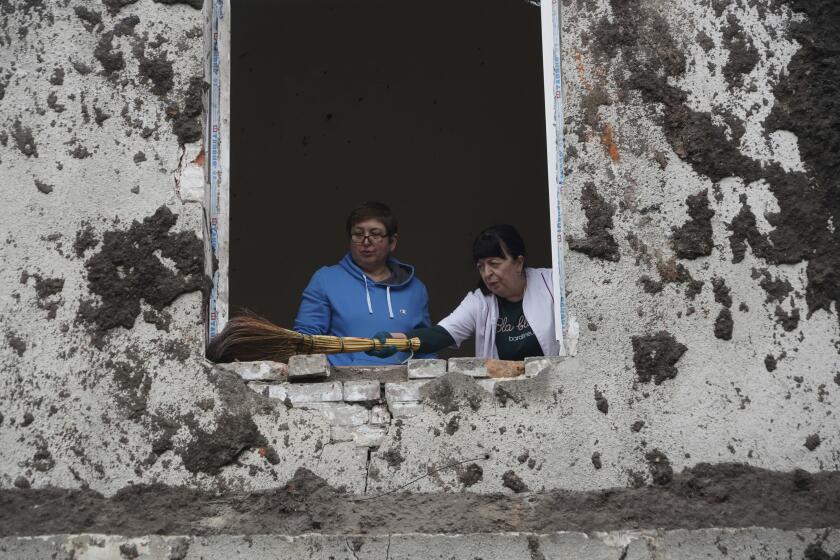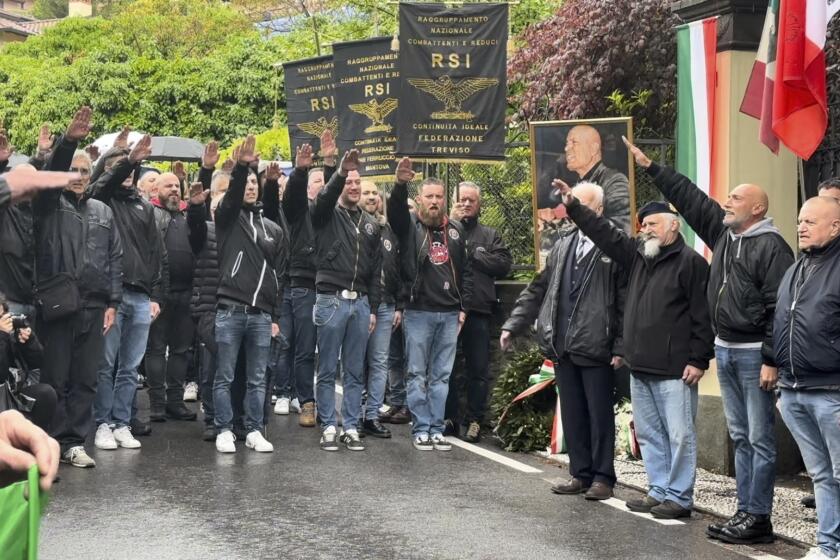In Colombia, key Uribe ally faces charges
Authorities on Tuesday ordered the arrest of President Alvaro Uribe’s cousin and confidant Mario Uribe, charging him with criminal conspiracy in alleged dealings with outlawed paramilitary groups.
The arrest warrant for Uribe, a former senator, brings a burgeoning “para-political” scandal involving the right-wing militias and Uribe-supporting members of Congress closer to the president’s office. Until now, the controversy has done little damage to President Uribe, who remains immensely popular.
Analysts described the arrest order for the president’s boyhood friend and closest political ally as a signal from chief federal prosecutor Mario Iguaran’s office that it would bring cases in the face of enormous political pressure.
“There was a lot of doubt that the prosecutor would take such a measure because of what Mario Uribe represents to the president,” said Mauricio Romero, a political scientist at Javeriana University in Bogota, the capital. “So this is a real depth charge for those being investigated that [Iguaran] will act forcefully in the theme of para-politics.”
Mario Uribe, who has denied the charges, sought political asylum at the Costa Rican Embassy in Bogota after learning of the arrest warrant. Costa Rica announced Tuesday night that it had denied the asylum request. The Associated Press reported that authorities said Uribe had been taken into custody.
President Uribe, in a statement late Tuesday, said the arrest order “hurts me.”
“I accept this pain with patriotism and with no effect on doing my duties, with my only interest in protecting institutions, protection that also depends on the heads of other branches of government,” he said.
According to Iguaran, Mario Uribe met with jailed ex-paramilitary leader Salvatore Mancuso in 2002 just before national elections. Another former militia leader turned government source said Uribe met with him about acquiring discounted land that paramilitaries controlled, Semana magazine reported this month.
The paramilitary groups, originally formed to defend farmers and ranchers against leftist rebels, eventually turned to drug trafficking and other criminal activities, including vote rigging, extortion and mass killings, prosecutors say.
Alvaro and Mario Uribe entered the Colombian Congress together in 1986. When the future president left to run successfully for governor of Antioquia state in the 1990s, Mario took his Senate seat.
“Mario Uribe is the politician closest to the president, not only for their family and political ties but because they once were in business together, buying and selling land,” said Daniel Coronell, a political commentator at Noticias Uno television.
Mancuso, dozens of other paramilitary leaders and 31,000 of their fighters surrendered in a demobilization process that ended two years ago. The leaders are now standing trial on assorted criminal charges, having taken up a government offer of lenient sentences in exchange for full confessions and the return of illegal gains.
With the militia leaders’ testimony, prosecutors have built cases against public officials who allegedly aided the militias in exchange for considerations that included rigging victories at the polls by threatening voters or buying votes.
Thirty sitting or former members of Congress have been arrested or are being sought in connection with the scandal. An additional 35 are under investigation. Several current and former governors also have been arrested or are being investigated.
President Uribe suffered another blow when the Supreme Court, which has jurisdiction over criminal inquiries of sitting lawmakers, said it was investigating two staunch supporters for unspecified links to paramilitaries: Sen. Nancy Patricia Gutierrez, who is also president of the Congress, and Sen. Carlos Garcia, who heads Uribe’s U Party.
President Uribe is the United States’ closest Latin American ally, and Colombia is the largest recipient of U.S. aid outside the Middle East and Afghanistan. But he has come under increasing fire from the U.S. Congress for failing to defend human rights, and the Democratic leadership in Washington in effect shelved a vote this month on a proposed U.S.-Colombia free trade agreement.
After it became known that he was being investigated by the Supreme Court, Mario Uribe resigned his Senate seat so as to fall under the jurisdiction of the federal prosecutor, perhaps thinking a change of jurisdiction would help his case, analysts said.
The scandal has heightened calls for reform of Colombia’s Congress. Opposition members want any party with at least half of its elected lawmakers under arrest or investigation for “para-politics” to lose their legal standing.
Despite the darkening panorama among his legislative supporters, President Uribe continues to ride a wave of popularity. A Mitofsky poll released Monday in Mexico City showed him with an 84% approval rating, the highest among Latin American leaders.
--
More to Read
Start your day right
Sign up for Essential California for news, features and recommendations from the L.A. Times and beyond in your inbox six days a week.
You may occasionally receive promotional content from the Los Angeles Times.






